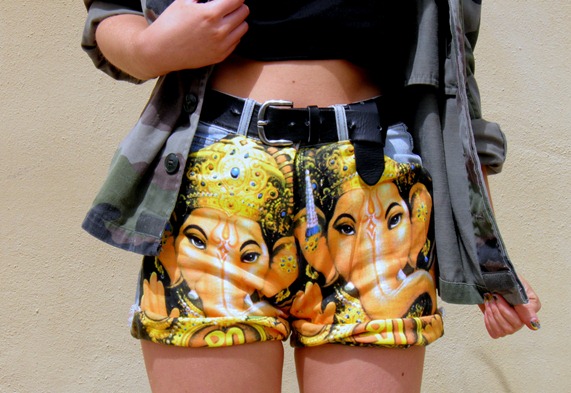Take my deity off your micro-shorts, please
At times, I think that an important linguistic distinction between assimilation and appropriation becomes lost amid our much-needed discussion about the fluidity of culture. Perhaps when, in the same argument, we start using two connotatively different words that both begin with ‘A’ and have five syllables, their distinctions become blurred. I’m really not sure, but before adding my two cents to this topic, I want to make sure that distinction is made clear.
Cultural assimilation is something I am very fortunate to have available to me because without it, my sense of first-generation, immigrant identity would be even more warped than it already is. Assimilation is what defines my Indian-American experience. It is what makes Holi on Claremont one of the most enjoyable days on campus, and it is also what allows me to look forward to the company of my family on Thanksgiving.
Assimilation does not detract from culture, but for me, it can make culture more nuanced, and this complexity allows us to integrate regardless our different backgrounds. Appropriation does not imply the same degree of mutual exchange. Appropriation allows people to senselessly take without giving, and its trivial nature divorces the appropriated custom from its original roots under the pretense of originality and trendiness.
It was this definition that led me to repetitively balk at the picture above of Ganesha being used to clad someone’s derriere in the form of some very distasteful and poorly tailored micro-shorts. I should not need to explain why placing a revered religious deity over your crotch for aesthetic reasons is disrespectful. The fact that people’s religion can now be exploited for the insensitive sartorial choices of a passing fad is truly contemptible. My wishful thinking leads me to believe someone wearing quite simply doesn’t know the significance of the figure on her shorts, and then perhaps I could blame the situation on cultural ignorance. However, this is not an isolated event. Urban Outfitters markets Ganesha on everything from bed sheets to shorts and tank tops, and you can’t convince me that an enterprise so large does not understand the cultural ramifications of one of their most used labels.
In an article about the cultural appropriation of Navajo designs, The New York Times wrote:
“Lesbian chic, Goth chic, rocker chic, Masai chic, androgynous chic, biker chic, punk chic, minimalist chic: fashion is culture’s Godzilla, devouring everything in its path. Half the time, the monster doesn’t know what it ate.”
The problem with this statement is that often enough, as in the case with Urban Outfitters, the monster does know what it ate, but admitting it would be like trying to figure out what it consumed after it has been digested. The ultimate product is so garbled that buyers can easily distance themselves from its source of inspiration.
So what exactly is the reason for all this? To me, the need to appropriate stems from a lack of inspiration and originality. For better or worse, we live in a society that is increasingly valuing the nonconformist. It is, after all, the black sheep whose story is ultimately immortalized, and the fear of mediocrity is unfortunately a good enough excuse for some to seek whatever makes them remotely unique. It’s not necessarily unavoidable, but its consequences need to be reevaluated, especially when the ultimate result is an increasing number of young adults who, in an attempt to distance themselves from mainstream culture, get away with the senseless appropriation, misuse, and disrespect of other cultures. The only profiteers in this situation are the businesses, like Urban Outfitters, whose Ganesh-printed shirts and bed sheets turn cultural appropriation into an even more disturbing platform for monetary gain.
There’s been quite some discussion over a similar topic, the cultural appropriation of bindis in Western culture, which to me basically concluded: If you’re not Indian, don’t wear a bindi. I’m not sure I agree with that, but how’s this for a revised version: If you don’t understand the cultural significance of something you wish to appropriate, or you don’t feel comfortable discussing and being honest about its significance, don’t appropriate it.
So no, Urban Outfitters, it is not acceptable to print a cultural and religious icon on t-shirts that will inevitably have food spilled on them, be sweated in, and eventually be discarded on the floor for a far-off laundry date. It is not ok to sleep and fornicate on bed sheets with my deity printed on it. Also, honestly, if the goal is ultimately to be novel, I would not look for inspiration in a religion that has been around since before the 13th century.
Rebecca Dutta
Blog Director Scr ’15

![[in]Visible Magazine](https://community.scrippscollege.edu/invisible/wp-content/uploads/sites/5/2011/04/Invisible-Masthead-2011-Spring1.png)









No comments yet... Be the first to leave a reply!